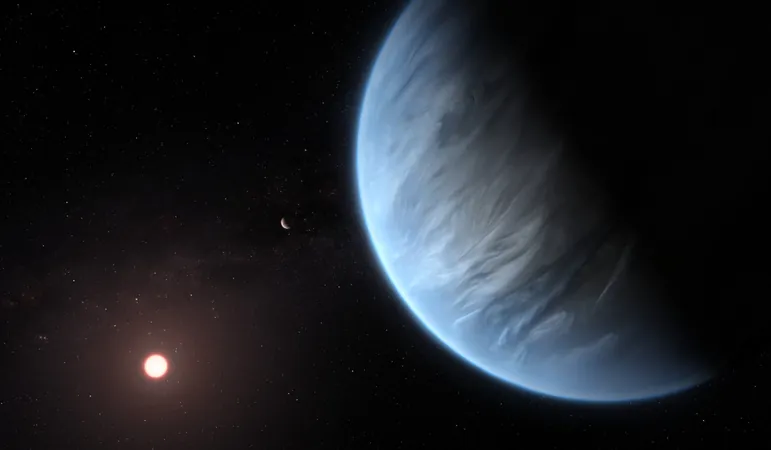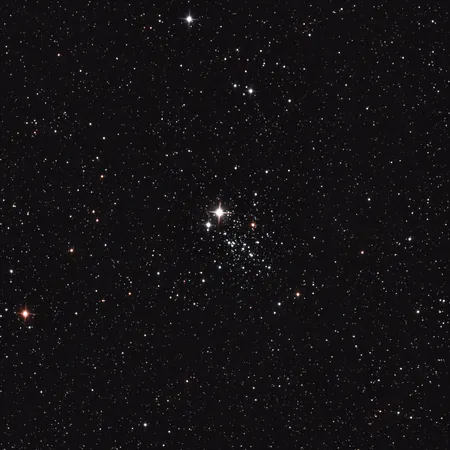
Are Water-Rich Exoplanets Just a Myth? Shocking New Findings on Sub-Neptunes
2025-09-18
Author: Li
Revolutionary Study Casts Doubt on Aquatic Exoplanets
In a stunning revelation that could reshape our understanding of distant worlds, researchers from ETH Zurich and other esteemed institutions have unveiled that the so-called sub-Neptunes, including the much-publicized K2-18b, are unlikely to be the water-rich ocean planets we once believed them to be.
K2-18b: The Planet That Captured Our Imagination
Initially heralded as a potential marine world with vast oceans teeming with life, K2-18b, located 124 light-years away, was a source of excitement for astronomers and enthusiasts alike. However, new insights suggest that our hope of discovering life in its deep waters may be misplaced.
Chemistry vs. Water: The Hidden Truth
Dr. Caroline Dorn, an expert on exoplanets, explains, "Water on planets is much more limited than previously believed." The latest study, published in The Astrophysical Journal Letters, indicates that chemical processes between the planet’s atmosphere and interior greatly reduce the amount of water that can actually exist on these planets.
The Unlikely origins of Sub-Neptunes
Previously thought to accumulate significant amounts of water during their formation, sub-Neptune exoplanets are now understood to have gone through a fiery start, covered by a molten magma ocean under a hydrogen gas shell. As they evolved, much of the water would have been trapped and destroyed by chemical reactions.
Dramatic Findings from Cutting-Edge Simulations
Using advanced models, researchers analyzed 248 simulated planets and uncovered that chemical interactions drastically decrease water content. The results revealed that any surface water remaining is likely only a few percent of the total mass, dispelling the myth of planetary 'Hycean' atmospheres laden with oceanic depths.
A New Perspective on Earth and Beyond
What’s more, this research may reframe how we consider Earth in the cosmic context. Dorn suggests that our planet might be less unique than we thought, likely sharing similar water content with many distant worlds. The findings also suggest that planets forming within the 'snow line' might yield atmospheric water not from accreted ice but from chemical reactions—challenging traditional theories of planetary formation.
The Search for Alien Life Just Got Harder
These insights imply a significant challenge in the hunt for extraterrestrial life. If habitable conditions with ample liquid water are rare, finding them will necessitate even more powerful telescopes than the current James Webb Space Telescope.
A Paradigm Shift in Exoplanet Research
As we embark on this new chapter of exoplanet research, the implications are profound. This study not only raises questions about the existence of water-rich worlds but also refines our understanding of how planets are formed and what their atmospheres consist of—all pivotal knowledge in the quest to find life beyond Earth.




 Brasil (PT)
Brasil (PT)
 Canada (EN)
Canada (EN)
 Chile (ES)
Chile (ES)
 Česko (CS)
Česko (CS)
 대한민국 (KO)
대한민국 (KO)
 España (ES)
España (ES)
 France (FR)
France (FR)
 Hong Kong (EN)
Hong Kong (EN)
 Italia (IT)
Italia (IT)
 日本 (JA)
日本 (JA)
 Magyarország (HU)
Magyarország (HU)
 Norge (NO)
Norge (NO)
 Polska (PL)
Polska (PL)
 Schweiz (DE)
Schweiz (DE)
 Singapore (EN)
Singapore (EN)
 Sverige (SV)
Sverige (SV)
 Suomi (FI)
Suomi (FI)
 Türkiye (TR)
Türkiye (TR)
 الإمارات العربية المتحدة (AR)
الإمارات العربية المتحدة (AR)